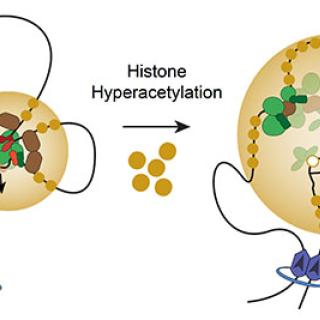News and Events
Celebrating CCR Careers: Steven Z. Pavletic, M.D., Ph.D.
Steven Z. Pavletic, M.D., Ph.D., is a renowned expert in chronic graft-versus-host disease, a serious late complication that can happen after allogeneic bone marrow transplants. After serving at the NCI for over 20 years, he is now announcing his retirement.
Read MoreFormer Pediatric Oncology Branch patient donates toys to NIH Pediatric Clinic
In December, former patient Julie Jones donated over 1,000 toys to the Pediatric Clinic at the NIH Clinical Center. Jones is a former patient in the Pediatric Oncology Branch who was treated more than 20 years ago for alveolar rhabdomyosarcoma. She says, “I remember what it was like. What these children are going through at such a young age really breaks your heart. I’ve often said there’s nothing greater than seeing the smile on the face of a sick child.”
Read MoreBinding preferences of Ras and Raf yield clues for developing targeted cancer therapies
Using living cells, researchers in CCR have found that a set of enzymatic proteins, known as Raf kinases, have differing affinities in how they bind to a class of cancer-related proteins, known as the Ras GTPases. This could offer new strategies for developing more effective targeted therapies.
Read MoreHistone deacetylase inhibitors block cancer-driving gene networks by obstructing DNA folding
Studies of the pediatric cancer rhabdomyosarcoma have revealed an unexpected way to intervene in cell-identity-determining networks that are abused by many aggressive cancers.
Read MoreDifferences between anti-viral and anti-tumor T-cell responses could impact immunotherapy
A finding published in Cell Reports holds promise for resolving some of the conundrums surrounding CD4+ T cells and their potential in fighting cancer. The work found that CD4+ T-cell responses to tumor antigens are quite different from those to infections, highlighting a need to re-think how to harness the power of CD4+ T cells.
Read MoreDifferences between anti-viral and anti-tumor T-cell responses could impact immunotherapy
A finding published in Cell Reports holds promise for resolving some of the conundrums surrounding CD4+ T cells and their potential in fighting cancer. The work found that CD4+ T-cell responses to tumor antigens are quite different from those to infections, highlighting a need to re-think how to harness the power of CD4+ T cells.
Read MoreNew findings hint at therapies for African Americans with lung cancer
A study published in Nature Communications reveals that two genes tend to be mutated at higher rates in cancerous lung tissue samples taken from African Americans, hinting that these patients may benefit more from certain therapies targeting those genes.
Read MoreUnlocking the key to HIV persistence
Even though antiretroviral therapies have allowed many people to live long lives, ridding the body of HIV completely has been an elusive goal ever since the discovery in the 1980s that HIV causes AIDS. New research from the Center for Cancer Research shows that proviral DNA sequences and their integration at specific sites could provide clues for researchers developing drugs to eradicate AIDS.
Read MoreClinical trial evaluates T-cell therapy for advanced mesothelin-expressing cancers
Some cancer cells express a higher-than-normal amount of mesothelin, which makes them more likely to multiply and spread to other parts of the body. Raffit Hassan, M.D., of the Thoracic and GI Malignancies Branch, is leading a trial that tests T-cell immunotherapy for patients with cancer of the lung and its lining, ovarian cancer and bile duct cancer that express high levels of mesothelin.
Read MoreComputational analysis leads to potential new drug combination for pancreatic cancer
A computer analysis has been able to predict that low levels of asparagine, an amino acid required for protein synthesis, combined with the shutdown of a stress response pathway can lead to reductions in the fitness of a tumor. These combined findings could potentially lead to new combination therapies to treat aggressive tumors, such as those found in pancreatic cancers.
Read MoreClinical trial will test radiotracer imaging for high-risk localized prostate cancer
Many men with prostate cancer are diagnosed at an early stage of the disease when the cancer is confined to the prostate. However, about 20 percent are diagnosed with high-risk disease, which tends to spread, or metastasize, to other parts of the body. William Dahut, M.D., Senior Investigator in the Genitourinary Malignancies Branch, is leading a study using positron emission tomography/computed tomography (PET/CT) with radioactive material to try and identify places in the body where prostate cancer has spread.
Read More








